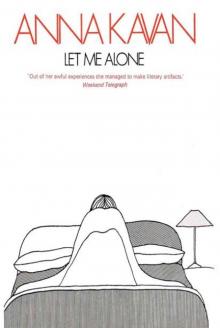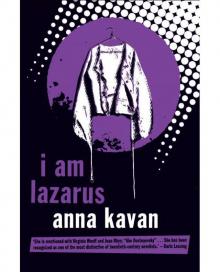- Home
- Anna Kavan
Who Are You? Page 5
Who Are You? Read online
Page 5
Even now she can't think of an answer. She knows that however often he repeats that it's quite easy for her to get on a boat or a plane, the proposition will remain purely theoretical to her; it will never, for a single instant, appear as something she might actually do. She looks at him appealingly, as if to beg him not to be angry with her. She doesn't want to annoy him, but feels incapable of explaining how impossible it is for her to resume her old life where it was broken off. She'll never make him understand that an impassable barrier separates her from her past for him, impassable barriers don't exist. The only thing seems to be to put forward the obvious obstacle of having no money.
And this he immediately sweeps aside with the greatest of ease, disposing of it at once. He will pay her fare for her. She can pay him back any time. Or never. It doesn't matter. His parents are rich, it appears, and have only sent him out here for a year or so to toughen him up, and because of certain youthful escapades he refers to with a wry grimace, without going into details.
At last she now lifts her head, putting back her hair with one hand, and wonderingly looks him full in the face. No one has ever treated her generously before; she is touched and astonished by his generosity. She can't bear to seem ungrateful, and hasn't the heart to refuse his offer, although the project seems just as unreal as it did before. To please him, she promises to think it over, and meanwhile continues to look at him — her expression almost makes him get up and hug her.
Instead, he changes the subject, reverting to one they've already discussed several times, which involves a, question nearly as difficult for her to answer. He wants to take her out in his car for a picnic; they can drive down to the river, where there's generally a cool breeze, or go a little way into the jungle she's never seen. There's nothing in the world she'd like better. Yet whenever lie asks her to fix a day she always becomes evasive and puts him off, in spite of the fact that they could easily get back before her husband, who often works late at his office. He can't understand it — he would never guess her real reason in a thousand years.
It is that she has a superstitious desire to keep everything the same between them. Any innovation seems dangerous, a threat to her precarious present happiness. If it were possible, she'd like to go on forever re-living that first afternoon, having the same identical conversation ad infinitum. Though she won't admit it, at the back of her mind is a constant dread of some fatal nightmare moment when everything will have to stop. But this fear is too formless and too obscure to put into words, so she never mentions it to him.
'We'll have to go very soon, if we're ever going,' he now remarks, with fresh urgency. 'It's impossible to go anywhere once the rains break.'
With passing surprise, she perceives that even the frightful heat has become unimportant to her lately. But now that she thinks of the weather she feels the added oppressiveness in the air and a new undercurrent of tension, like electricity — almost like something about to explode. She's still searching for a reply that won't displease him when, to her relief, a brain-fever bird in the tamarinds calls out so loudly that she can't be expected to say anything till it stops.
Who-are-you? Who-are-you ? Who-are-you ? echoes another bird, in flight seemingly, the question getting louder and louder as it approaches; it flaps and flutters among the green clusters of the banana trees just outside, shouts, Who-are-you ? right into the room, then flies off again, still calling out at the top of its voice the question nobody ever answers, which is repeated by all the other brain-fever birds for miles around.
Who-are-you ? Who-are-you ? Who-are-you ? The mounting volume of noise comes from both sides of the house, from the back, from the front, from the compound, the road, the swamp, the trees, from everywhere at once. Hundreds, thousands of birds are all shouting their heads off the girl's never heard them make such a racket. The frantic cries sound to her not only demented but threatening, so that she feels uneasy. Some of them seem to sound distinctly ominous. Yet she must imagine this, for, in reality, all the cries are exactly alike. All have the same infuriating, monotonous, unstoppable persistence; all sound equally mechanical, motiveless, not expressing anger, or fear, or love, or any - sort of avian feeling - their sole function seems to be
to drive people mad.
No human voice can compete with the din. The two under the fan have to sit helplessly, waiting for the row to subside. Suede Boots smiles, and she, disguising the uneasiness she can't get rid of, smiles back. Her hands have instinctively covered her ears, but she lowers them with the intention of asking if all the birds have gone suddenly crazy. At the same moment, however, she notices that he is no longer smiling.
He has already heard the new sound she is only just catching, which is also mechanical and monotonous and has the same inexorable persistence common to all machine-made noise, that goes on and on, indifferent to everything. It's not easy to follow the low hum, or rumble, through the delirious pandemonium of the birds' repetitive questions. Hardly has she recognized it as the sound of an approaching car than it stops
Everything stops with it. Or so it seems. The birds' (Ties, at any rate, are abruptly cut off, and it's impossible to tell whether they've been interrupted by the car, or whether their explosive outburst has come to its natural conclusion. In the sudden silence, the footsteps which can be heard steadily coming nearer sound unnaturally loud. Beating on the stone floor with the terrifying, inflexible regularity of a machine nobody can stop, they progress towards the door, the flaps of which fly apart to admit Mr Dog Head.
He stands a few paces away, staring at the pair. His cold, very bright blue eyes have a glint that seems not quite normal. His hat has left a red ring round his forehead; it might be the diadem of a prince to judge by his haughty, domineering expression. No one speaks or moves. All three of them seem held in suspense, as if mesmerized. Only the fan continues its lackadaisical circling, the high squeak it emits with each revolution now piercingly loud.
This of course is the moment the girl dreads, when everything will suddenly come to an end. Although her fear isn't fully conscious she feels she must make some kind of effort to save her happiness. She starts moving the teapot in front of her as if it were some heavy object, but doesn't manage to complete the gesture, which would be futile in any case. 'Will you have some tea ?' Her low voice travels a little way into the silence, but seems to make no headway against it, and expires, leaving her mute and motionless as before.
Her husband takes no notice whatever of her. His blue eyes stare icily, fixedly, at the visitor, with disgust and abysmal contempt. His big aristocratic nose arches itself superciliously as he asks, ' What are you doing here ? ' as though he were asking: 'Why did you ever have to emerge from the primordial slime?’
Suede Boots, who's got up in confusion, stammers something, steps forward and holds out his hand, hardly knowing what he is doing the man's lordly, insulting behaviour, combined with the tension it's impossible to ignore, deprive him completely of his usual aplomb.
For a second, or for several seconds, these two confront one another. They are dressed alike. Both wear shorts, and a short-sleeved bush jacket which, with belt, numerous buttoned pockets and shoulder tabs has a vaguely military aspect. But while in one case this might be the uniform of a general, in the other it's more like a Boy Scout's. The wearer's young, bare, rounded knees look half pathetic, half comic; most unlike the tough, sinewy, hairy knees of his much taller senior, who is in every way far more formidable, in his arrogance and his gaunt, mature, muscular virility, beneath which can be felt a disturbing suggestion of something faintly unbalanced.
Suddenly, without warning, in sudden mad irritability, Dog Head lifts his clenched fist and brings it down with terrific force on the outstretched hand, knocking it away from him. 'Out !' he snaps, like a savage dog; the single-syllable command, and the accompanying jerk of the head, both express ultimate scorn.
The young man goes very red in the face, and, inarticulate with pain and rage, bursts into unintelligible ind
ignation, looking more than ever like a furious little boy, almost on the verge of tears. He's like a sort of juvenile Jack the Giant Killer before his opponent. Except that it's obviously the giant who will do the killing in this case.
‘Out !' The command is snapped for the second time, with insufferable superiority. ‘Or are you waiting to be slung out by the scruff of your neck ?'
The young fellow's red face turns quite pale now, but he gamely assumes a fighting attitude, although it's only too evident to him that he hasn't a chance - not a hope in hell - against this lunatic, who will ‘wipe the floor
with him ', ‘make mincemeat of him ', etc.
But at the last moment, the girl saves the situation for him by crying, ‘Oh, no . . !' and hiding her face in her hands.
Whereupon, much relieved, he sensibly abandons his pugilistic stance, thankful for the chance to retire without being branded a coward. He pretends he is doing it for her sake, as he hurries out of the room, avoiding her with his eyes, and looking extremely uncomfortable as well as shamefaced.
As if materialized by the order, 'Go and make sure he is off the premises,' Mohammed Dirwaza Khan receives the command with a bow, and immediately glides out in silent pursuit of the departing guest.
Husband and wife are now left alone. The latter hasn't moved, and remains in the same position, her face hidden, while the fan's squeak reaches a maddening climax, rasping the nerves. Owing to the defective mechanism, the high, shrill screech is repeated at slightly irregular intervals, and these marginal variations are unpredictable, and as agonizing as Chinese water torture.
The girl's silence is unendurable to the man, who now comes forward and stops in front of her, his eyes flaring crazily. As she still doesn't speak or look up, he seizes her shoulders, and roughly shakes her backwards and forwards to force her to attend to him.
‘Are you listening to me ?' — even now he's not certain That piddling pup isn't to come into this house again — ever ! Do you understand ?'
Even this doesn't make her open her mouth. And when, after a minute, he lets her go, she at once returns to her former pose, with her face in her hands. The only difference is that his rough handling has further disarranged the untidy hair, which now falls over her hands and wrists in such a way as to leave the back of her neck uncovered. More of the pale shiny mass of hair is exposed to the draught of the fan, loose strands of it thrust themselves out like tentacles in different directions, the many separate hairs on the surface weave in and out of each other continually, producing unexpected tremors and eddies, surrounding her bowed head with a misty effect, as ceaselessly circling insects surround a lamp.
The man is in a black rage, scowling, and compressing his lips till they disappear in a thin line, clenching and unclenching his hands convulsively. Convinced she's deliberately taunting him, he takes her silence as a challenge to his inborn supremacy, which is intolerable. Nor can he endure this frustration — why can't he make her speak ?
As he stands there, looking down at her, baffled, very slowly a faint tinge of doubt invades his furious, overbearing expression. He has no idea what to do next.
The quinine, already buzzing inside his head, blends with the squeal of the fan in a fiendish disharmony, increasing his rage and frustration to an insufferable degree of intensity. The lightly stirring hairs he is staring at seem to dissolve in mist . . . through which all he sees is the nape of her neck, pale and sprinkled all over with small, faintly glistening beads, stretched out before him like that of a victim waiting for execution . . .
Such a murderous frenzy of violence surges through him that, shocked by it, he turns away blindly, and hurries out of the room.
13
As soon as the Suede Boots episode ends, it seems never to have happened. It's almost as though there has never been any such person, as he no longer passes the house, preferring to make a lengthy detour, that must waste a lot of his time.
Dog Head has satisfactorily intimidated him. It's his wife he doesn't seem able to master. She never even says she's sorry — not a word of apology does she utter. He doesn't suspect her of a serious affair, but imagines people are laughing at him, which makes him mad. It's outrageous that she should dare to humiliate him like this. Somehow he simply must get his own back.
Officially the subject is closed. He doesn't refer to it any more. All goes on as before. But, though outwardly he is the same as ever, underneath he seems to be changing. Always now there's that indefinable hint about him of something queer, almost like a touch of madness. A mad frenzy of resentment against her has got into him, which increases as the days pass. The atmosphere is changing too, in the house and outside. Every day the heat grows more intolerable; a weird undercurrent of electrical tension builds up . . . an uncanny excitement . . . as in a dream that has moved imperceptibly into nightmare . . .
He doesn't want to be with his wife, everything about her gets on his nerves, and yet he can't leave her alone. If he asks her to ride or play tennis with him, she always refuses. It exasperates him beyond words to see her mooning about aimlessly, or sitting for hours with her nose stuck in a book. If she's too lazy to take healthy exercise, he asks why she doesn't at least talk to the other women.
She knows it's foolish to answer such questions but, I her nerves not being immune to the general tension, is provoked into saying: 'What can I talk about ? If I mention anything that interests me, a book or a play, they think I'm affected — they don't understand intelligent conversation.'
This brings forth: 'Fuck you and your intelligent conversation !' The man looks at her in blazing indignation; how dare she put on airs just because she's supposed to be brainy? His arrogant face frightens her, the blue flame in his eyes really does seem a little mad, and she avoids him as much as she can.
Periodically his work takes him away for a day or two, which ought to be a relief. But then her absolute loneliness falls on her like a ton weight. The house is silent, full of heat, emptiness, and the hostility of the servants, who watch her with black unfriendly eyes as she eats her solitary meals. If only she could have her food on a tray somewhere ! But of course that's not to be thought of. The household routine must go on. Everything has been settled for her in advance by people who don't wish her well. Why are they all against her? She remembers the women who used to say, ' You'll get to like living here in time,' their voices showing they knew very well that she wouldn't like it, and were gloating over the fact.
What on earth is she doing here, anyway, among all these brain-fever birds, parrots, vultures, snakes, scorpions, big bright spiders, and ants that can eat a whole bush in half an hour? It doesn't seem to be her life at all. It's more like a dream, that only is not a nightmare because she knows it won't last forever this is the knowledge that keeps her going.
In the meantime, the days seem endless. Each day is like a balloon, blown up to bursting point by the heat and the tension of the approaching monsoon. Electric tension gathers beneath the great clouds that pile up always gone the next morning — while the earth swelters in airless suspense. It's too hot to think, even. She seems to spend her time waiting — for night to come, or simply for the next minute.
She drags herself up the stairs to put some eau-de-Cologne on her neck and forehead, and afterwards wanders out on to the flat roof of the porch. Out here it seems hotter than ever, in the unnatural half-light under the clouds. She's never seen such clouds, enormous, massive, menacing, black, with yellow underbellies, forming an iron roof over the simmering world. Their shadow brings a strange burning hush in which a gong booms out startlingly. And suddenly a single tremendous buffet of hot wind, like a blast from the devil's furnace, almost sweeps her off her feet, showering her with dust and the small, dry, shriveled leaves of the tamarinds.
Her eyes are still full of dust, she hasn't had time to collect herself, when the youth who wears the white turban appears behind her. Missis come in now,' he orders disapprovingly, his attitude towards her modeled on that of his superior.<
br />
As she steps inside he immediately slams the shutters, and then goes all round the house, banging them to with a noise of protest. Padding away finally on his bare feet, he leaves her to stew in solitude under the squeaky fan, in the simmering gloom that seems like the end of the world.
It's too dark to read, and, when she switches the light on, the heat of the bulb slaps her face. So she turns it out again, kicks off her sandals, and sits doing nothing, simply waiting for time to pass, abandoned to heat and discomfort. Presently she hears someone coming, and rouses herself from this daze; her feet instinctively find their way back into the discarded sandals.
In comes Mr Dog Head, sweat streaming down his face, but otherwise unaffected by the heat, which he won't condescend to notice. Forgetting the nightmarish atmosphere momentarily, the girl actually finds his arrival a welcome break in the arid, interminable, eventless expanse of time. She smiles and says, 'Hello,' blinking in the daylight that streams into the room after him, against which he stands outlined. How can he be so impervious to the heat ?--it doesn't seem human. His tough, angular frame might be made of metal, or any substance that isn't sensitive to the temperature.
'Sitting in the dark ?' He neither smiles nor returns her greeting, addressing her in the same disapproving tone that the servant used not long ago. Even before she hears his censorious voice and sees him eyeing her with suspicion, she recalls despairingly the hopelessness of attempting to talk to him. And she says no more.
As he hasn't seen her for a few days he looks at her more attentively than usual, noticing that she's become paler and thinner than she used to be; which she seems to have done on purpose to annoy him, so that he snaps : 'What's the matter with you ? Aren't you well ?' She can't see his face clearly against the light, but doesn't need to, being only too familiar with that particular overbearing tone - surely he isn't going to start a quarrel already? She feels she can't stand the effort of quarrelling in this appalling heat, and says quietly that the weather makes her head ache.

 Machines in the Head
Machines in the Head Ice
Ice Who Are You?
Who Are You? Let Me Alone
Let Me Alone Sleep Has His House
Sleep Has His House The Parson (Peter Owen Modern Classic)
The Parson (Peter Owen Modern Classic) Guilty: The Lost Classic Novel
Guilty: The Lost Classic Novel I Am Lazarus (Peter Owen Modern Classic)
I Am Lazarus (Peter Owen Modern Classic)